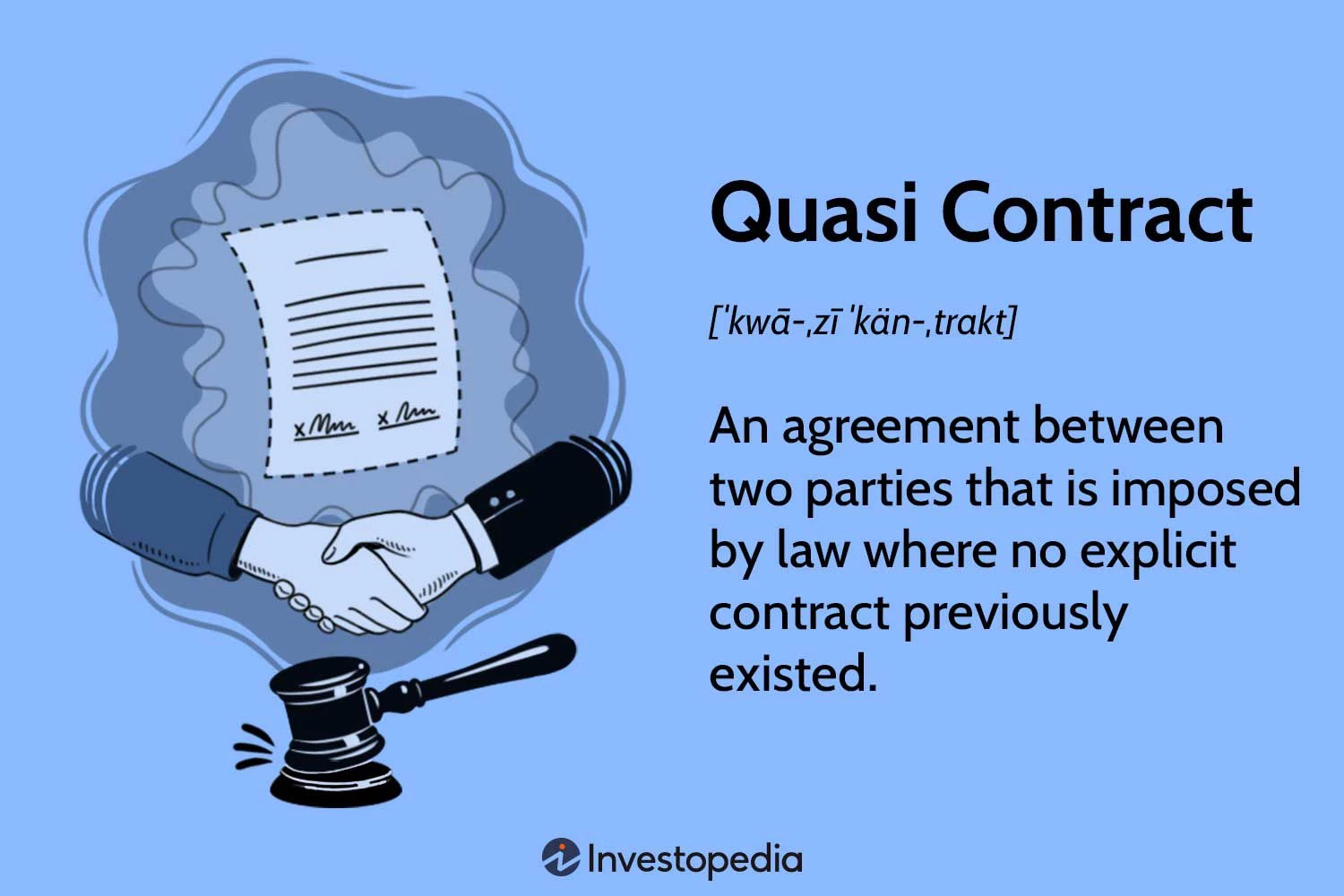Understanding Quasi Contracts: Explained
A quasi contract, also referred to as a contract implied in law, serves as a legal remedy for resolving disputes between two parties who lack a formal contract. It is a judicially imposed obligation that compels one party to compensate the other. Essentially, a quasi contract is a retrospective judgment that corrects situations where one party benefits at the expense of another.
These arrangements come into play when goods or services are received by a party, even if not explicitly requested. By accepting these goods or services, an expectation of payment is created for the provider.
Unveiling the Origins of Quasi Contracts
In common-law jurisdictions, quasi contracts trace back to the Middle Ages under the legal concept of indebitatus assumpsit. This Latin term, translating to being indebted or undertaking a debt, signifies the court’s imposition of an obligation akin to a contractual agreement where none existed. Originally, quasi contracts were primarily used to enforce restitution obligations.
This legal principle compels parties to fulfill obligations as if an actual contract were in place. The remedial aspect, known as quantum meruit, determines the amount of restitution owed based on the unjust gain of the defendant.
Referred to as a constructive contract, a quasi contract is constructed by the court in the absence of a formal agreement between parties. It is worth noting that if a contractual arrangement already exists, a quasi contract is unnecessary.
Quasi contract is also known as an implied-in-law contract.
Significance of Quasi Contracts: Purpose and Legality
Quasi contracts define the obligations of a receiving party when they benefit from something delivered by another party. These contracts address situations where a person provides value to another without a formal agreement, assuming reasonable compensation or restitution is due upon receipt of the benefit or service.
The primary purpose of quasi contracts is to prevent exploitation of one party by another and ensure fair compensation to the provider, thereby preventing unjust enrichment.
Legal Requirements for Quasi Contracts
For a judge to establish a quasi contract, certain conditions must be met:
- One party, the plaintiff, must incur a loss due to a transfer.
- The defendant must have received and retained the valuable item without intending to pay for it, leading to unjust enrichment.
- The plaintiff needs to demonstrate why the defendant’s gain is unjust, and the transaction should not be categorized as a gift.
- The defendant must have had the choice to accept or reject the benefit.
Comparing Quasi Contracts and Formal Contracts
- Quasi Contract
- Contract
Contrast: Quasi Contract
- Implied in Law: Obligations rendered by the law rather than mutual agreement.
- Judicial Order: Mandated by a judge to rectify unjust gains.
- No Formal Agreement: Remedies for disputes where no formal contract exists.
Dissecting a Contract
- Express or Implied: Agreement laid out explicitly or inferred from actions.
- Party Initiation: Initiated by mutual consent.
- Legally Binding: Recognized and enforceable by law.
Categories of Quasi Contracts
Section 68 to 72 of the Contract Act of 1872 elaborate on the various types of quasi contracts:
- Section 68: Assistance provided to an incapable party obligates reimbursement from their assets.
- Section 69: Payment made on behalf of another party warrants reimbursement.
- Section 70: Obligation for repayment arises when an action benefits another unintentionally.
- Section 71: Finder of goods assumes duties similar to a bailee.
- Section 72: Repayment required for money received under coercion or by error.
Unjust enrichment occurs when someone inappropriately benefits from a situation.
Weighing Pros and Cons of Quasi Contracts
Benefits of quasi contracts stem from preventing one-sided gains, offering legal deterrence against unfair enrichment, and ensuring compensation for service providers. By upholding court-mandated agreements, all parties are compelled to comply.
Limitations include instances where negligence or inadvertent benefits may not incur liability. The recovered sum under a quasi contract cannot exceed what was received, constraining full compensation if only partial goods or services were delivered.
Additionally, in cases with an express agreement, plaintiffs may relinquish profits, necessitating proof of damages due to contractual breaches for relief under a quasi contract.
Pros and cons of quasi contracts:
- Prevents unjust enrichment
- Legally binding through court order
- Not applicable in all scenarios
- No provision for additional damages
Demystifying Quasi Contracts: An Overview
A quasi contract involves an implied repayment obligation where a defendant is mandated to reimburse the plaintiff. This legal construct is designed to ensure equitable treatment and prevent unjust gains from exploiting others.
Defining Quasi Contracts in Layman’s Terms
Simply put, a quasi contract is a court-imposed obligation between parties to prevent unfair enrichment in the absence of a mutual agreement.
Illustrating a Quasi Contract Example
An instance could be Person A promising payment to Person B for assistance in moving, and despite verbal terms, retracting the offer. In such scenarios, if a lawsuit ensues seeking restitution, a quasi contract might be invoked.
Summing Up Quasi Contracts
A quasi contract mandates the defendant to abide by terms similar to a lawful contract with the plaintiff. Through this legal mechanism, the aim is to prevent unfair advantages and rectify situations where one party benefits at the expense of another, ensuring just outcomes.
